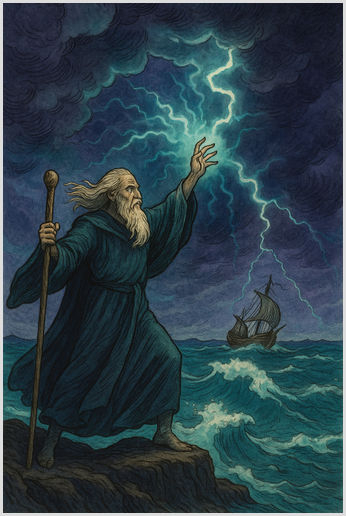The Tempest is one of the final plays William Shakespeare ever wrote in 1610-11. The story focuses on the magician Prospero, who lives on a remote island near Italy with his daughter Miranda and two servants: the monster Caliban and the spirit Ariel.
The play has many themes, such as magic, betrayal, and forgiveness. This article will cover the key themes with references to the plot and quotes from central characters in The Tempest. It is aimed at students revising for their GCSE English Literature exams.
If you need support learning these themes, TeachTutti has skilled English Literature GCSE tutors who can provide personalised tuition in person or online.
Power and control
Prospero is a gifted sorcerer and the former Duke of Milan. When the play begins, he is betrayed by his brother, Antonio, and King Alonso of Naples. He escapes by boat with his infant daughter Miranda to a remote island. Prospero conjures a fierce storm that shipwrecks his enemies on this island. He represents authority through his command of magic. He uses these magical powers to control the actions and fate of every character living on the island.
Prospero's power can be seen through his relationships with Ariel and Caliban. Ariel is a spirit who is indebted to Prospero after he frees her from imprisonment. He binds her to servitude, promising she will be freed if she performs tasks. He frequently asserts his authority by reminding the spirit of this debt, underscoring his control through threat and intimidation:
"If thou more murmur'st, I will rend an oak and peg thee in his knotty entrails till thou hast howl’d away twelve winters" (Act 1, Scene 2)
Caliban is the only inhabitant of the island. When he arrives, Caliban is forced to protect Prospero and Miranda. He is treated harshly by Prospero and resents his dominance. The following quote by Caliban also reflects the themes of colonialism and exploitation:
"This island's mine, by Sycorax my mother, which thou tak'st from me" (Act 1, Scene 2)
Prospero also manipulates many of the visitors to the island, such as using illusions to confuse and control characters. In Act IV, Prospero instructs Ariel and other spirits to create a masque - a dramatic, theatrical entertainment - to encourage Miranda, now 15 years old, to marry Ferdinand.
Freedom and servitude
The struggles and aspirations of characters are shown in the contrast between freedom and captivity. In particular, Ariel and Caliban represent different perspectives on freedom and servitude.
Ariel's desire for freedom is evident as soon as she is introduced. She is an airy spirit imprisoned in a pine tree for 12 years by Sycorax, a witch and Caliban's mother. Prospero frees her and repeatedly reminds her that his liberation of Ariel justifies her current service to him. She shows a deep desire for autonomy. Her obedience is borne from the promise of eventual freedom, rather than any feeling of obligation or gratitude. It shows how freedom can be both a powerful incentive and a form of coercion:
"Is there more toil? Since thou dost give me pains, let me remember thee what thou hast promised" (Act 1, Scene 2)
Caliban's captivity is less nuanced. He was the rightful inhabitant of the island and was enslaved by Prospero, subjected to menial labour and harsh treatment. His bitter captivity is enforced upon him, rather than consented to. For example, he is desperate to change masters to improve his situation when he meets the king's jester Trinculo and Stephano, the king's majordomo. Through Caliban, Shakespeare depicts how enslavement is a tragedy that can distort your perception of freedom:
"I'll show thee every fertile inch o' th' island; And I will kiss thy foot. I prithee, be my god" (Act 2, Scene 2)
In contrast, the relationship between Miranda and Ferdinand causes Ferdinand to willingly accept servitude so he can court Miranda. He believes his voluntary servitude is noble, as it is the result of love. This suggests that freedom and bondage are as much psychological conditions as they are physical states, shaped by a person's motives and emotions:
"The mistress which I serve quickens what's dead and makes my labours pleasures" (Act 3, Scene 1)
Forgiveness and reconciliation
Forgiveness and reconciliation are key themes in The Tempest, where certain characters have to confront past wrongdoings and the need for redemption. Chief among these is Prospero, who has to choose between vengeance and mercy.
Prospero was usurped as the rightful Duke of Milan by his brother Antonio, who betrays him with King Alonso. Alonso and Antonio usurp his title and his dukedom when the play begins, forcing Prospero to flee with his infant daughter. As Prospero's intricate plans reach their climax, he is conflicted by the moral choice of forgiveness. He acknowledges this and decides to forgive rather than exact revenge, reflecting the power of compassion:
"Though with their high wrongs I am struck to th' quick, yet with my nobler reason 'gainst my fury do I take part. The rarer action is in virtue than in vengeance" (Act 5, Scene 1)
Alonso also expresses regret for his complicity, especially when he believes his son Ferdinand was lost at sea due to the storm that Prospero created. He is genuine in his repentance, which enables the eventual reconciliation with Prospero:
"The seas and shores, all creatures against your peace" (Act 3, Scene 3)
Prospero's forgiveness of Caliban is more nuanced. He remains stern, but recognises that they have a complex relationship. This shows Prospero is aware of his impact in shaping Caliban's behaviour, which is the result of mutual faults:
"This thing of darkness I acknowledge mine" (Act 5, Scene 1)
Nature versus nurture
Shakespeare explores the idea of nature and nurture in The Tempest, questioning if we are shaped by inherent traits or external influences. The clearest example of this theme is the contrasting experiences of Miranda and Caliban. Both are raised by Prospero, yet they have sharply contrasting personalities and morality.
Miranda was only 3 years old when she was exiled from Milan. She was raised in isolation from society, representing innocence and virtue. Her kindness and empathy are clear when she reacts to the shipwreck caused by the storm. Her character has also been nurtured by Prospero, who has protectively raised her to retain and cultivate her gentleness, morality and grace. This suggests a balance of nature and nurture is important, with the latter arguably more so:
"O, I have suffered with those that I saw suffer!" (Act 1, Scene 2)
Caliban is initially welcomed to Prospero's family when they arrive on the island. He is the son of the sea witch Sycorax and is part human, part monster. Prospero attempts to civilised him, but he later attempts to rape Miranda. At this point, Prospero breaks off their relationship and harshly condemns him as a savage. Shakespeare presents him as brutish, yet the reader is encouraged to question whether his harsh treatment and rejection by Prospero worsened rather than remedied his behaviour:
"a devil, a born devil, on whose nature nurture can never stick" (Act 4, Scene 1)
The debate of nature or nurture is further complicated by Antonio, Prospero's brother, and Sebastian, the brother of King Alonso. They plot to murder Alonso and Gonzalo so that Sebastian can become king. They both have a noble upbringing and yet display moral decay. Their treachery is proof that neither birth nor upbringing guarantees virtue and that human nature is more complex than this age-old argument.
Magic and illusion
Magic is perhaps the most dominant theme in The Tempest. It sets the scene when Prospero causes the storm at the beginning of the play. It drives the play's atmosphere and plot. Prospero's supernatural abilities allow Shakespeare to explore the boundaries between reality and fantasy.
Prospero has control of his destiny and those around him, thanks to his magical abilities. He can shape events and manipulate characters. The tempest he conjures causes ships to sink in the storm and sets a dramatic tone. His magic is powerful and symbolic, representing Shakespeare's creative ability to craft compelling visions for the audience:
"the sky, it seems, would pour down stinking pitch" (Act 1, Scene 2)
The masque in Act IV is a theatrical illusion that Prospero conjures to celebrate the engagement of Ferdinand and Miranda. It features the classical goddesses Juno, Ceres and Iris. However, this suddenly vanishes when Prospero realises he has forgotten the plot against his life. At the moment when the scene suddenly changes, it highlights the fleeting nature of life and illusion, implying that magic is a metaphor for human vulnerability:
"We are such stuff as dreams are made on; and our little life is rounded with a sleep" (Act 4, Scene 1)
By the end of the play, Prospero decides to stop using magic, effectively renouncing his power. It is a symbolic act in which he discards his use of illusion and returns instead to reality and human interaction. The play ends with applause when Prospero asks that the audience set him free. Shakespeare uses this moment to reflect on power, creativity and the ethical responsibilities of those who wield influence over others:
"I'll break my staff... I'll drown my book" (Act 5, Scene 1)
Conclusion - Key themes in The Tempest
The Tempest is rich with themes that remain relevant to modern audiences. Shakespeare encourages the viewer to reflect on power, including the use and abuse of it, the longing for freedom and warped perspectives caused by a person's imprisonment, the strength and value in forgiveness, the importance of upbringing to a person's traits and moral compass, and the illusions that affect reality.
For further reading, you can read Sparknotes' article about the background and context of The Tempest. Shakespeare's Globe has also written a list of 10 key quotes to memorise in The Tempest.
If you need extra support studying this play, TeachTutti have experienced and approved English Literature GCSE tutors. Every tutor is DBS checked and will tailor lessons to your specific needs, such as preparing revision notes.
This post was updated on 10 Jul, 2025.

